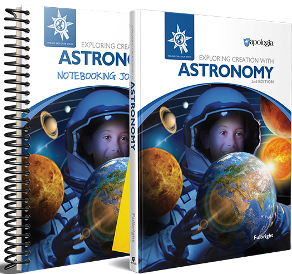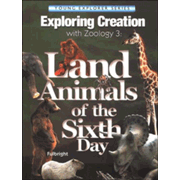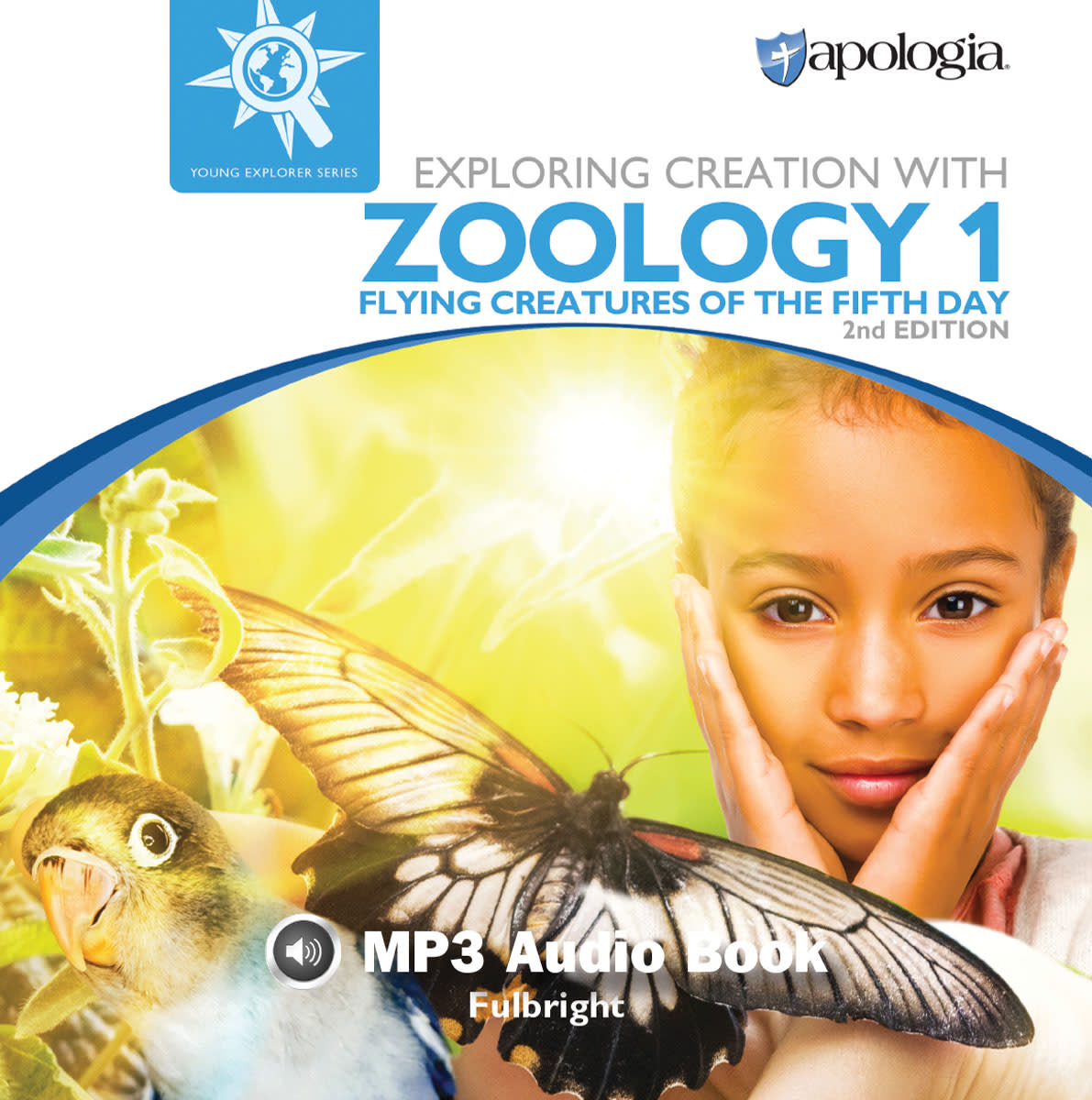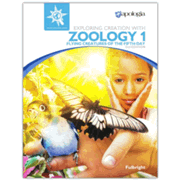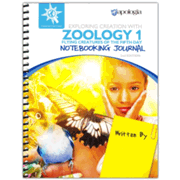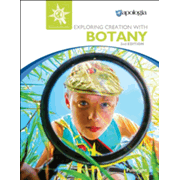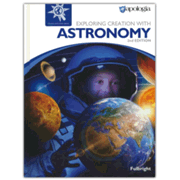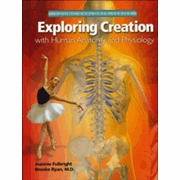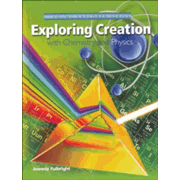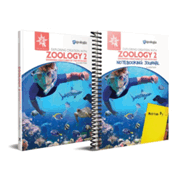At first glance, the Apologia Exploring Creation textbooks look like standard textbooks for elementary and middle schools. They’re nicely printed with full-color illustrations, but the focus on a narrow area of science for each text and the methods of lesson presentation make these significantly different. In addition, each textbook is designed to be used with students from kindergarten through sixth grade.
The titles in the series are:
- Exploring Creation with Astronomy, second edition
- Exploring Creation with Botany, second edition
- Exploring Creation with Human Anatomy and Physiology
- Exploring Creation with Chemistry and Physics
- Exploring Creation with Earth Science
- Exploring Creation with Zoology 1, second edition - (birds, bats, flying reptiles, and insects), second edition
- Exploring Creation with Zoology 2, second edition - (only creatures that live in water)
- Exploring Creation with Zoology 3, second edition - (various orders of land animals including reptiles, amphibians, spiders, insects, worms, gastropods, and dinosaurs)
Most science textbooks for the elementary grades tend to cover many areas of science every year. However, as you can see by the titles, the books in this series each cover just one or two areas of science, so there's more in-depth coverage. Since there are eight textbooks and six grade levels, you will probably have to select topics of most interest rather than try to complete all of them.
This series takes an “immersion approach,” emphasizing depth over breadth through the use of information, activities, writing, field trips, experiments, and other avenues to study each topic. This type of learning helps students develop a sense of wonder and appreciation.
The primary author of these courses, Jeannie Fulbright, writes as if she is chatting with her own children in a style that is very conversational and personal. Audio recordings add yet another dimension to learning as Fulbright reads each of the textbooks aloud. Rachael Yunis, author of Exploring Creation with Earth Science, writes and narrates that textbook in the same manner as Fulbright. The optional audio recordings are available in MP3 format on CDs or as downloads.
The writing style is just one of the elements of this series that reflects Charlotte Mason's methodology. Other elements of that methodology are narrations, nature observations, and journaling.
Narrations might require some explanation. The textbooks have narration prompts that occasionally appear after a section of text. For example, children are asked to: “Explain in your own words the most interesting things you learned about the Praying Mantis” (Zoology 1, p. 134). Children are to respond with their own thoughts at this point, and it can develop into a conversation. This is a casual way to assess whether or not they are grasping the main ideas. (You might even want to prompt for narrations more frequently than occurs in these textbooks.)
Each textbook is divided into 14 lessons, and each lesson will take at least a few weeks to complete. “What Do You Remember?” questions at the end of each lesson help to assess whether or not children are retaining the information from the entire lesson. Parents can require students to write out answers or respond orally. Answer keys are at the back of each textbook.
To keep things interesting, the text is also broken up with frequent activities. The Astronomy, Botany, Zoology 1, Zoology 2, and Zoology 3 courses are second editions, and Earth Science (published in 2021) is similar to the second editions. These courses are loaded with activities in comparison to the rest of the textbooks. Many of the activities are fairly simple, although some are more complex. In the older courses, there are occasional activities in the middle of lessons, and an experiment is usually conducted at the end of a lesson. Older editions also have separate projects—two of the projects are to be used as term projects.
The activities, experiments, and projects usually don’t require esoteric resources. Lists of the necessary resources (organized by chapter) are included in the textbooks, making it easy to plan ahead. Required resources include items such as matches, wire, empty soda bottles, plaster of Paris, plants, glycerin soap bars, and pinecones.
A bonus with each course is a password to a dedicated website with additional helpful tools for each course.
Notebooking Journals
The first-edition textbooks frequently suggest notebook activities under separate headings for younger and older students, and students were originally supposed to create their own notebooks for each course. Apolgia's Notebooking Journals were created after the fact to lessen the workload for students.
First-edition courses have both regular-level Notebooking Journals (for about grades three through six) and Junior Notebooking Journals to be used by beginning writers, typically first and second graders. All Notebooking Journals are hefty (about 200-300 pages each), plastic-spiral-bound books that serve as the student’s notebook for written work, experiments, drawings, etc. Notebooking Journals for the first-edition courses (with the exception of the one for Earth Science) are printed in black and white.
Formatted pages in all of the Notebooking Journals support the writing assignments, investigations, activities, and projects that are in the textbooks. A Fascinating Facts section provides space for students to write their summary of information for each lesson. For some lessons, a "What Do You Remember?" section reprints the review questions from the text, allowing space for students to write their answers. Project pages, experiment pages, and activity and observation pages are used for recording observations, drawings, and other information for each course's activities. Other useful resources in the Notebooking Journals vary from course to course. These include scripture copywork pages, crossword and word-search puzzles that help students review vocabulary from the lessons, cut-and-fold miniature books in which students can write key information, and sheets for recording information from field trips.
The Regular Notebooking Journals also have a 50-question final review for the entire course and "Dig In Deeper" assignments that expand lessons with additional experiments, activities, research, and supplemental books and media. These extra resources, including the final review, are all optional. The Junior Notebooking Journals add two coloring pages per lesson, require less writing, and have handwriting lines appropriate for students in the primary grades.
The full-color Notebooking Journals for second-edition courses and Earth Science cover grades one through six but lack age-differentiated activities. Parents need to select those appropriate for their children.
The first-edition Notebooking Journals require quite a bit of writing. However, parents are encouraged to help struggling writers, emphasizing content rather than the writing itself. Apologia states that Notebooking Journals are always optional, and everything a student needs to complete a course is found in the student textbook.
Lapbook Option
Instead of, or in addition to, using a Notebooking Journal, you might want to have your children create lapbooks. Both Knowledge Box Central and A Journey Through Learning sell lapbooks that correlate with these textbooks. Both companies also have shorter version lapbooks that could be completed in addition to an Apologia Notebooking Journal. A Journey Through Learning also offers instructions and templates for large lapbooks that could be used in place of an Apologia Notebooking Journal.
Summary
The Exploring Creation series is clearly Christian in outlook, continually reaffirming God’s role as creator. Occasionally, evolutionary beliefs are addressed directly, but these textbooks mostly take a positive approach by teaching the creationist position rather than attacking evolution.
These courses were written primarily for parents who want to be more involved with their elementary student’s education. The textbooks are written at a reading level well beyond that of children in the primary grades. The textbooks include Latin and scientific names, sometimes including explanations of word derivations. Since these textbooks are designed to be interactive and conversational, parents should plan to read the books aloud to younger elementary students and set aside time to discuss the lessons in a conversational style.
Overall, there is more activity and variety in these courses than in traditional textbooks. The format makes it easy for parents to provide an excellent balance of information and activity that should be very effective for science instruction in the elementary grades.





